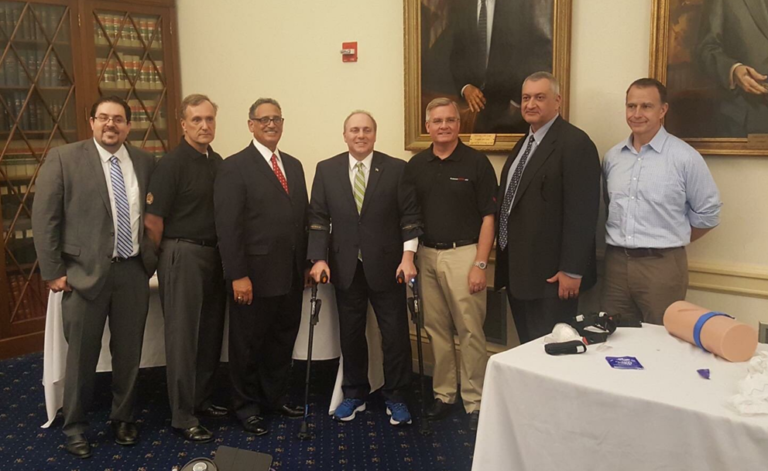Nearly 40 members of Congress received training on Thursday from surgeon members of the American College of Surgeons (ACS) on how to stop potentially life-threatening bleeding.
Lawmakers attending the event included Rep. Steve Scalise, who was shot last June during a baseball practice. Rep. Scalise suffered life-threatening bleeding along with significant injuries to his pelvis and femur. Scalise credits his survival in part to Rep. Brad Wenstrup — a physician and former Army Ranger — who treated him on the scene with an improvised tourniquet.
“Other than calling 911, bystanders usually think that there’s little they can do to assist with severe bleeding injuries,” said Lenworth M. Jacobs, Jr., MD, MPH, FACS. “It is vital for legislators to understand how important bleeding control training is and support its expansion nationwide.”
Dr. Jacobs has played a leadership role in the Stop the Bleed program since the 2012 Sandy Hook tragedy. Other surgeons participating in the event were Joseph Sakran, MD, FACS, Leonard Weireter, MD, FACS, John Armstrong, MD, FACS, Mark Gestring, MD, FACS, and Jack Sava, MD, FACS.
Stop the Bleed is major initiative for ACS
Each year, more than 180,000 people die from traumatic injuries sustained as a result of motor vehicle crashes, falls, industrial and farm accidents, natural disasters, and tragic mass casualty events like the recent Las Vegas shooting. The most common preventable cause of death in these situations is the loss of too much blood in the minutes before trained immediate responders arrive.
The Stop the Bleed class teaches participants how to use tools and techniques that were born on the battlefields of Vietnam and further reinforced during the wars in Iraq and Afghanistan. The program was developed by the Joint Committee to Create a National Policy to Enhance Survivability from Intentional Mass Casualty and Active Shooter Events, with strong support from the Hartford Consensus and oversight from the ACS Committee on Trauma.
In addition to promoting Stop the Bleed training, the ACS also advocates for widespread access to bleeding control education before federal and state lawmakers. For more information about the Stop the Bleed program and to find a nearby training, visit www.bleedingcontrol.org.

